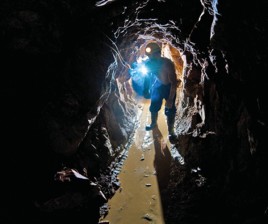
LIGHT IN THE TUNNEL Under EO 79, small-scale miners like the one above in Itogon, Benguet, will be confined to the “Minahan ng Bayan.” They are also banned from using mercury to process the mined ores. RICHARD BALONGLONG / INQUIRER NORTHERN LUZON
President Benigno Aquino’s new mining order is a virtual warning to local officials and communities not to pass ordinances banning mining, environmentalists said Wednesday.
The Legal Rights and Natural Resources Center-Kasama sa Kalikasan/Friends of the Earth Philippines (LRC-KsK/FoE Phils) singled out Executive Order No. 79’s provision declaring that local government units must conform to the national government’s policy on mining.
“What the provision intends to do is to prevent other LGUs from following the footsteps of numerous other LGUs that have issued local legislation and already stood up against minerals extraction in their respective territories and protected the welfare of their people,” said the group’s program officer Gerry Arrances in a statement.
In effect, the administration was sending a strong message that it would pursue “its promotion of mineral extraction and its business-as-usual framework, thus continuing wanton destruction of our communities and the environment,” Arrances said.
In issuing EO 79 early this week, Mr. Aquino sought to institutionalize reforms in the mining sector and provide guidelines to ensure environmental protection and responsible mining in the use of mineral resources.
However, some of the EO’s provisions, particularly Section 12, which directs that local ordinances be made consistent with the Constitution and national laws, has stirred some controversy.
According to the EO, LGUs should confine themselves to the imposition of “reasonable limitations” on mining activities within their jurisdiction, and that these should be consistent with national laws and regulations.
The national government did not need to spell this out in EO 79 because LGUs were well aware of this when they enacted ordinances banning mining, complained Arrances.
After all, by passing such ordinances, the LGUs were only exercising their police power and upholding the general welfare and their constituents’ right to a “balanced and healthful ecology” and the well-being of their local territories and ecosystems, he said.
Jaybee Garganera, national coordinator of the Alyansa Tigil Mina (ATM), conceded that the President’s mining order introduced reforms, such as the identification of mining-free zones, increased transparency and a system for the review and monitoring of mining contracts.
These reforms, however, were overshadowed by the provision that all contracts, agreements and concessions approved prior to the order were considered valid and binding, he said.
“We sincerely believe that [the] DENR (Department of Environment and Natural Resources) does not have the people, the expertise, the resources and the equipment to effectively enforce this EO, and so the policy is misleading as it gives a false sense of comfort that from now on, ‘all will be well,’” he added.
According to the ATM, any increase in the revenue share of the government from the mining industry would be irrelevant given the industry’s allegedly negative impact on the communities and the environment.
“These are the reasons why we need a new mining law, and not only rely on this EO,” Garganera said.
Anabelle Plantilla, chief operating officer of the Haribon Foundation, said the EO was proof that the government recognized the flawed policy in the mining industry.
“The proof of the pie is in the eating. We have documented on how the Mining Act created a big rift in the protection of the environment and then we have another policy that yet again has weak provisions on the conservation of our forest and ecosystem. Do we need to eat this pie again?” she said.